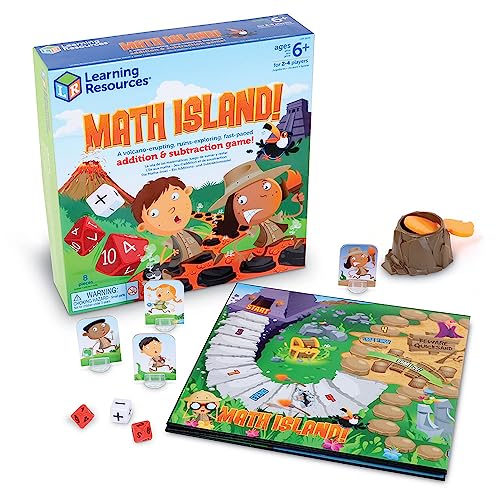If you're looking for fun math games for kids, I've found some great options! Math Blast! is perfect for ages 8-12, while Math Pop It uses flash cards for younger learners. For a vibrant board game, Math Island covers addition and subtraction. Don't miss out on the Adsumudi game or the Math Whiz handheld for tech-savvy kids. Each game offers something unique to keep math engaging. Stick around, and you'll discover even more exciting choices!
Key Takeaways
- Diverse Age Range: Many math games cater to various age groups, ensuring engaging learning experiences for kids aged 3-12.
- Interactive Gameplay: Games like Math Blast! and Math Island promote hands-on learning, making math enjoyable through competitive and cooperative play.
- Skill Development: Most games focus on essential math skills, such as addition and subtraction, while encouraging strategic thinking and mental math proficiency.
- Positive Feedback: High ratings and endorsements from educators, like in Math Whiz and University Games Scholastic Math Match, highlight their effectiveness and popularity.
- Versatile Formats: Options range from board games to electronic devices, accommodating different learning styles and preferences for both solo and group play.
Math Blast! Educational Math Game for Kids 8-12
If you're looking for an engaging way to help kids aged 8-12 improve their math skills, Math Blast! is a fantastic choice. This game features 50 Challenge Cards and 75 Math Equation Cards that cover addition, subtraction, multiplication, and division. It's perfect for 2-6 players and includes a 30-second timer, which keeps the excitement high. I love how it encourages strategic thinking while making math fun. Teachers endorse it for reinforcing skills, especially for those who struggle with traditional methods. Plus, it's a great way to enjoy screen-free learning time with family or friends!
Best For: Kids aged 8-12 who want to enhance their math skills in a fun and engaging way.
Pros:
- Encourages strategic thinking and mental math skills through interactive gameplay.
- Endorsed by teachers for its effectiveness in reinforcing math concepts, particularly for struggling learners.
- Provides a screen-free learning experience, making it a great activity for family or friends.
Cons:
- Some customers reported issues with game components, such as receiving fewer dice than expected or broken timers.
- Adjustments may be necessary to ensure challenges are age-appropriate for younger players.
- Limited to specific math skills, which may not cover all areas of a child's math curriculum.
Math Games for Kids – Math Pop It with Flash Cards
Math Games for Kids – Math Pop It with Flash Cards is the perfect choice for young learners aged 4 to 8 who are keen to enhance their math skills. I've found that this game makes learning fun with its interactive approach, covering addition, subtraction, multiplication, and division. The durable flash cards are easy to use, making it great for at-home learning or school activities. Kids love the colorful design, and I've seen noticeable improvements in their math abilities. Plus, it's portable, so we can take it anywhere. It's truly an ideal gift for birthdays or back-to-school surprises!
Best For: Young learners aged 4 to 8 who want to enhance their math skills through interactive play.
Pros:
- Engaging and interactive learning experience that keeps kids interested.
- High-quality, durable materials that are portable and easy to use.
- Comprehensive coverage of essential math concepts like addition, subtraction, multiplication, and division.
Cons:
- Some users reported missing instructions which may lead to confusion.
- Quality concerns with certain components have been noted by a few customers.
- Not all kids may find the flash cards and games equally appealing, depending on their learning style.
Learning Resources Math Island Addition & Subtraction Game
The Learning Resources Math Island Addition & Subtraction Game is an excellent choice for kids aged 6 and up who need to sharpen their math skills while having fun. In this engaging game, players roll equation dice to solve addition and subtraction problems, steering through a vibrant board filled with challenges like quicksand and an erupting volcano. With colorful visuals and cooperative play, it's perfect for 2-4 players and promotes essential counting skills. I love how it makes learning math enjoyable and effective. Plus, the positive reviews and high-quality components make it a worthy investment for any family.
Best For: Children aged 6 and up who want to enhance their addition and subtraction skills in a fun and interactive way.
Pros:
- Engaging gameplay that combines math practice with enjoyable challenges, keeping kids motivated.
- High-quality components and colorful visuals that attract children and enhance the gaming experience.
- Promotes cooperative play, making it suitable for family game nights or classroom activities.
Cons:
- May be too simple for older children or those with advanced math skills.
- Requires adult supervision for younger players to ensure fair play and understanding of the rules.
- Limited to only addition and subtraction, which may not cater to broader math skills.
Adsumudi Math Game for Kids (Ages 8-12)
Looking for a fun way to boost your child's math skills? I found the Adsumudi Math Game, which is perfect for kids ages 8-12. This game features 52 double-sided cards with 416 unique challenges that cover multiplication, division, addition, and subtraction. It's engaging and adaptable for different skill levels, making it great for remote learning or family game nights. The gameplay allows for competitive, collaborative, or individual play, catering to various learning styles. With a 4.6-star rating from over 1,000 reviews, it's highly praised by parents and educators alike. Give it a try; your kids will love it!
Best For: Families, teachers, and homeschoolers looking for an engaging way to enhance children's math skills.
Pros:
- Versatile gameplay allows for competitive, collaborative, or individual play, catering to various learning styles.
- Adaptable difficulty levels with star rankings on cards, making it suitable for different ages and skill levels.
- Highly rated with a 4.6-star rating from over 1,000 reviews, indicating positive feedback from parents and educators.
Cons:
- Limited to ages 8-12, which may not appeal to younger or older children.
- Physical card format may not be as engaging for kids accustomed to digital games.
- Requires multiple players for the full experience, which may not be feasible for solo learners.
Educational Insights Math Whiz Electronic Handheld Math Game for Kids
For kids aged 6-10 who want to make math practice enjoyable and engaging, the Educational Insights Math Whiz Electronic Handheld Math Game is an excellent choice. I love how this game offers three play modes: Drill, Challenge, and Calculator, making it easy for kids to learn addition, subtraction, multiplication, and division. With eight difficulty levels, it adapts to their skills, boosting confidence while making math fun. Plus, it's portable and lightweight, perfect for on-the-go learning. Parents appreciate its educational value and the positive feedback from kids. Just remember to grab two AAA batteries, as they're not included!
Best For: Children aged 6-10 who need an engaging and interactive way to practice essential math skills.
Pros:
- Engaging gameplay makes learning math enjoyable and less intimidating for kids.
- Adaptable difficulty levels cater to various skill sets, promoting independent learning.
- Portable design allows for on-the-go math practice, making it convenient for travel or waiting rooms.
Cons:
- Durability concerns have been noted by some users regarding the product's long-term use.
- Battery compartment accessibility may be challenging for younger children without adult assistance.
- Requires two AAA batteries, which are not included, potentially adding extra cost for parents.
Proof! Math Game – The Fast Paced Game of Mental Math Magic
Designed for kids aged 9 and up, Proof! is a fast-paced math game that's a total blast! It's engaging for 2-6 players and takes just 10-15 minutes to play. I love how it improves mental math skills—addition, subtraction, and more—while keeping everyone on their toes. With 100 easy-to-use number cards, I can easily adapt the rules for younger players or even play solo. The excitement is contagious, and I've noticed my confidence in math has soared! Plus, it's perfect for family game nights or a fun beach day. Trust me, you'll want to keep playing again and again!
Best For: Families, educators, and children aged 9 and up looking for a fun way to enhance mental math skills.
Pros:
- Improves mental math skills such as addition, subtraction, multiplication, and division in an engaging way.
- Quick setup and gameplay allows for multiple rounds in a single sitting, making it ideal for game nights.
- Adaptable rules make it suitable for various skill levels and ages, providing an inclusive experience for all players.
Cons:
- Price concerns may arise as some consider it just a card deck compared to other educational tools.
- Limited complexity for advanced players who may find the game too simple over time.
- Requires active participation from all players, which may not suit those who prefer less interactive games.
Math Blast! Cool Math Games for Kids 8-12
is perfect for kids aged 8-12 who need a fun and interactive way to sharpen their math skills. This game includes 50 Challenge Cards and 75 Math Equation Cards covering addition, subtraction, multiplication, and division, making it ideal for various learning levels. You can play solo or compete against friends in exciting modes like Battle and Partner challenges. I love how it promotes strategic thinking while helping kids improve their mental math skills. Plus, it's endorsed by educators and parents alike, making it a great choice for reinforcing math concepts without screens. It's educational fun at its best!
Best For: Kids aged 8-12 who want an engaging and interactive way to improve their math skills.
Pros:
- Engaging Gameplay: Offers a variety of game modes that keep children entertained while learning.
- Educational Value: Reinforces essential math skills in a fun, hands-on manner, endorsed by educators and parents.
- Versatile Learning: Suitable for different learning levels, making it accessible for children with varying math abilities.
Cons:
- Component Quality Issues: Some users reported receiving fewer dice than expected or faulty timers.
- Age Appropriateness: Adjustments may be needed for younger players to ensure challenges are suitable for their skill level.
- Limited Player Count: Designed for 2-6 players, which may limit playability in larger groups.
University Games Scholastic Math Match Travel Dice Game for Kids
If you're looking for a fun way to reinforce essential math skills, the University Games Scholastic Math Match Travel Dice Game is perfect for kids aged 5 to 12. This engaging game, endorsed by Scholastic, helps kids practice addition, subtraction, multiplication, and division in a dynamic way. Whether played solo or with friends, it's beginner-friendly and encourages a positive attitude towards math. I've seen firsthand how it makes learning interactive and enjoyable. Plus, it's a great option for family game nights, allowing quality time away from screens while boosting academic performance. Trust me, it's a game worth adding to your collection!
Best For: Kids aged 5 to 12 who want to enhance their math skills through an interactive and fun game.
Pros:
- Engaging gameplay that makes practicing math enjoyable, fostering a positive attitude towards learning.
- Endorsed by Scholastic, ensuring a reputable educational experience.
- Flexible play options allow for solo or competitive gameplay, catering to different learning preferences.
Cons:
- May be too simplistic for older children or those with advanced math skills.
- Requires multiple players for a competitive experience, which may not always be available.
- Limited to basic math skills, potentially lacking in more advanced concepts for older students.
ThinkFun Math Dice Junior Game for Kids Aged 6
For young learners enthusiastic to enhance their math skills, the ThinkFun Math Dice Junior Game is an ideal choice. I love how this game transforms math practice into a fun experience! With bright, colorful dice, kids can practice addition and subtraction while aiming for a target number. It's perfect for both competitive and noncompetitive play, making it versatile for classrooms or home. Plus, it's received rave reviews—4.5 stars from nearly 7,000 ratings—highlighting its ability to engage kids and boost their arithmetic skills. This game truly makes learning math enjoyable and is a fantastic gift for budding mathematicians!
Best For: Young learners aged 6 and up who are eager to improve their math skills in a fun and engaging way.
Pros:
- Enhances mental math skills and cognitive abilities through enjoyable gameplay.
- Versatile play options allow for both competitive and noncompetitive experiences, suitable for various settings.
- High customer satisfaction with a 4.5 out of 5-star rating based on nearly 7,000 reviews, indicating its effectiveness in making math fun.
Cons:
- May require adult supervision for younger players to ensure understanding of the rules.
- Limited to basic addition and subtraction, which might not be challenging enough for older or more advanced children.
- Gameplay may become repetitive after extended use, potentially leading to decreased interest.
Sums in Space – Addition and Subtraction Game for Kids 5-7
Looking for a fun way to boost your child's math skills? "Sums in Space" is the perfect choice for kids aged 5 to 7, blending education with play. This engaging board game teaches addition and subtraction while promoting teamwork among 2-4 players. With two 10-sided dice and an operations die, kids roll to solve math problems, making learning interactive. The game features exciting elements like bridges and black holes, keeping it fresh each time you play. Parents and teachers love its adaptability for different skill levels, making math less intimidating and more enjoyable for young learners. Give it a try!
Best For: Children aged 5 to 7 who need to improve their addition and subtraction skills in a fun and interactive way.
Pros:
- Engaging gameplay that combines learning with fun, making math enjoyable for kids.
- Suitable for various skill levels, allowing for differentiated learning through adjustable rules and dice.
- Encourages social interaction and teamwork among players, fostering communication and collaboration.
Cons:
- Some users report that the game board layout and pawn designs could be improved for better usability.
- The game may require adult supervision initially to help younger players understand the rules and mechanics.
- Limited to basic addition and subtraction, which may not challenge more advanced young learners.
Target Math Game for Practicing Mental Math (Ages 8+)
The Target Math Game stands out as the perfect choice for kids ages 8 and up, thanks to its customizable difficulty levels and engaging gameplay. I love how it helps improve essential math skills like addition, subtraction, multiplication, and division while boosting confidence. This fast-paced game is great for 2-6 players, making it ideal for family game nights or remote learning. With high-quality, durable cards, it's designed to last. Plus, I've noticed my kids enjoy learning math more than ever! If you want to make math fun and effective, the Target Math Game is definitely worth considering!
Best For: The Target Math Game is best for children ages 8 and up who want to enhance their math skills while having fun with family and friends.
Pros:
- Engaging gameplay that makes learning math enjoyable for kids and adults alike.
- Customizable difficulty levels cater to various age groups and skill levels, ensuring everyone can participate.
- Durable high-quality cards designed to withstand frequent use, perfect for family game nights or classroom settings.
Cons:
- Some players may find the game too fast-paced, which could be challenging for younger or less confident learners.
- Requires at least two players, which might limit use in solo study sessions.
- May not cover advanced math topics for older students beyond basic arithmetic skills.
Educational Insights Math Slam Digital Math Game for Kids
Kids ages 5 to 9 will find the Educational Insights Math Slam Digital Math Game both fun and engaging. This handheld game focuses on early math skills like addition and subtraction, making it perfect for young learners. With five unique game modes, it keeps kids entertained while they practice. I love the colorful lights, sounds, and built-in timer that add excitement to gameplay. Plus, it's easy to mute for quiet play in the classroom or during car rides. Overall, it's an effective tool for boosting confidence in math abilities while providing endless fun. Just be sure to grab some AA batteries!
Best For: Kids ages 5 to 9 who are looking to enhance their early math skills through fun and engaging gameplay.
Pros:
- Durable and engaging design that holds up well during frequent use, making it ideal for car rides and daily play.
- Five unique game modes that keep children entertained while practicing addition and subtraction skills.
- User-friendly features such as colorful lights, sounds, and an option to mute for quiet play in various environments.
Cons:
- May be too easy for older children, leading to limited engagement for kids above age 9.
- Some users have reported functionality issues, such as non-working buttons affecting gameplay.
- Requires 3 AA batteries, which are not included, adding an extra purchase necessity.
Number Park – Addition & Subtraction Math Games for Kids Ages 5-8
Designed specifically for children ages 5-8, Number Park offers a vibrant and engaging way to master addition and subtraction skills. I love how it includes 78 math flash cards and a colorful game board, making learning visually appealing. The game encourages friendly competition among family and friends, promoting strategic thinking while reinforcing math concepts. It's adaptable for different skill levels, so everyone can enjoy it. Plus, the bilingual instructions make it accessible to even more kids. While some say the player pieces could be a bit larger, overall, Number Park is a fantastic tool for making math fun and interactive!
Best For: Number Park is best for children ages 5-8 who are looking to enhance their addition and subtraction skills in a fun and interactive way.
Pros:
- Engaging gameplay promotes friendly competition and strategic thinking among players.
- Includes bilingual instructions, making it accessible for a wider range of children.
- The colorful design and 78 math flash cards make learning visually appealing and enjoyable.
Cons:
- Some users have noted that the player pieces are small and could be improved with larger characters.
- While designed for various skill levels, some children may require additional guidance to fully understand the concepts.
- Limited to addition and subtraction, which may not cater to those seeking broader math skills development.
ThinkFun My First Math Dice – Counting Game for Kids
For young learners aged 3 and up, ThinkFun My First Math Dice is a fantastic choice to introduce early math concepts in a fun, interactive way. This game includes chunky, easy-to-handle dice and colorful counter chips, making it perfect for little hands. I love how simple the gameplay is; even preschoolers can grasp the instructions quickly. I've noticed my kids enjoying independent play, which fosters concentration and patience. At under ten dollars, it's an affordable gift that provides hours of educational entertainment. Overall, it's a delightful way to make learning counting and math skills enjoyable!
Best For: Young learners aged 3 and up who are beginning to explore early math concepts in a playful manner.
Pros:
- Engaging gameplay that enhances counting and math skills.
- Compact and portable design, perfect for home or travel.
- Affordable price point under ten dollars, making it a great gift option.
Cons:
- Limited complexity may not be challenging for older children.
- Requires adult supervision for very young players to understand the rules.
- Some users may find the game components can be easily lost if not stored properly.
Learning Resources Sum Swamp Game for Early Math Skills (Ages 5+)
If you're looking for a fun way to help young learners develop essential math skills, the Learning Resources Sum Swamp Game is an excellent choice for children ages 5 and up. This engaging board game combines addition and subtraction challenges with a colorful swamp theme, making math enjoyable. Players navigate the board using swamp creature pieces while rolling dice to tackle math problems. With a 4.8-star rating from parents, it's clear kids love it! Plus, it fosters fluency in early math concepts without the pressure of traditional learning. Overall, it's a fantastic tool for making math fun and interactive!
Best For: Young learners aged 5 and up who are looking to develop essential math skills in a fun and interactive way.
Pros:
- Engaging way to teach addition and subtraction.
- Colorful design and fun gameplay.
- Promotes learning in a low-pressure environment.
Cons:
- Game pieces may feel cheaply made.
- Subtraction mechanics can be confusing for younger players if they don't understand order of numbers.
- Limited to basic math skills, may not challenge older children sufficiently.
Factors to Consider When Choosing Math Games for Kids

When I choose math games for kids, I always consider a few key factors. Age appropriateness and skill level adaptability are essential to guarantee the game is both fun and effective. I also look for engaging gameplay mechanics, educational value, and high-quality components to keep kids interested and learning.
Age Appropriateness
Choosing the right math games for kids can make a significant difference in their learning experience, especially since age appropriateness plays a key role. When I look for games, I always check the recommended age range. Games designed for younger children (ages 4-8) focus on foundational skills like basic addition and subtraction, while those for older kids (ages 8-12) introduce more complex operations, such as multiplication and division. I've found that age-appropriate games enhance engagement and minimize frustration, keeping kids challenged but not overwhelmed. Plus, many educational games offer adjustable difficulty levels, accommodating various skill sets within the same age group. Reviewing user feedback also helps me gauge a game's effectiveness in meeting educational goals.
Skill Level Adaptability
While finding the right math games for kids, I always prioritize skill level adaptability. It's essential that the games cater to various abilities, allowing both beginners and advanced learners to engage meaningfully. I appreciate games that offer multiple levels of difficulty, which enable customization for each player's unique needs. This not only promotes progressive learning but keeps the experience enjoyable. I also look for tiered challenges that provide different modes of play, whether cooperative or competitive, enhancing engagement. Adaptive features, like adjustable rules or varied card difficulty, help maintain interest and motivation. Ultimately, effective math games bridge gaps in understanding by reinforcing foundational skills while encouraging the development of more advanced concepts.
Engaging Gameplay Mechanics
Engaging gameplay mechanics are essential for making math games enjoyable and effective for kids. I've found that incorporating timed challenges and competitive modes really amps up excitement and encourages active participation. Games that offer different play modes—like solo, partner, or battle formats—cater to various learning preferences and group dynamics, which I think is fantastic. Interactive elements, such as dice rolls or cards, not only keep kids entertained but also foster strategic thinking. Fast-paced rounds maintain interest and energy, encouraging kids to play repeatedly. Finally, tiered difficulty levels guarantee that all players, regardless of their skill, can enjoy and benefit from the game. These mechanics make learning math a fun and engaging experience!
Educational Value
When it comes to selecting math games for kids, the educational value should be a top priority. I always look for games that reinforce foundational skills like addition, subtraction, multiplication, and division. These games help kids become fluent in essential math concepts. It's also beneficial if the games are designed with input from educators, as they often provide a structured learning experience that keeps kids engaged. I prefer games that offer various difficulty levels, catering to different skill sets and learning styles. Interactive elements, whether cooperative or competitive, can truly enhance motivation. Finally, engaging visuals and hands-on components stimulate interest and promote active participation, making the learning process enjoyable and effective for young learners.
Component Quality
Choosing the right math game for kids involves paying close attention to component quality. I've found that high-quality components not only enhance durability but also make the game more enjoyable. For instance, games like the Learning Resources Sum Swamp Game have robust materials that stand up to repeated use. Colorful visuals catch kids' eyes and spark their interest, while pieces designed for small hands promote ease of use, reducing frustration. Clear instructions are essential too; they should be straightforward, allowing kids to grasp the rules without constant adult help. Finally, consider portability—games that are easy to store and transport encourage more frequent playtime, whether at home or on the go.
Frequently Asked Questions
How Can Math Games Improve My Child's Problem-Solving Skills?
I've noticed that math games really boost my child's problem-solving skills. When they play, they're not just having fun; they're faced with challenges that require critical thinking and creative strategies. Each game encourages them to tackle problems from different angles, enhancing their analytical abilities. I love seeing them develop resilience, too, as they learn to persist through tough levels. It's amazing how play can lead to such meaningful growth in their skills!
Are There Math Games Suitable for Children With Learning Disabilities?
Like a treasure map guiding a child through challenges, math games can be tailored for those with learning disabilities. I've found that there are plenty of engaging options designed specifically to support different learning styles. These games often incorporate visual aids, hands-on activities, and adaptive difficulty levels, making them inclusive. It's amazing how these tools can help build confidence and enhance problem-solving skills while ensuring every child feels successful and motivated.
What Age Range Is Appropriate for These Math Games?
I've found that math games can be suitable for a wide age range, typically from preschool through elementary school. For younger kids, games with basic counting and number recognition work well. As they grow, I've noticed they can handle more complex games involving addition, subtraction, and even basic multiplication. It's all about matching the game to their developmental level, so they stay engaged and challenged without feeling overwhelmed.
Can These Games Be Played Solo or Do They Require Multiple Players?
When I think about playing games, I love the thrill of a group challenge, but sometimes, I just want a quiet solo experience. Luckily, many of these math games cater to both preferences. Some can be played alone, allowing me to sharpen my skills at my own pace, while others thrive on teamwork, creating a lively atmosphere. It's great knowing I can choose based on my mood or who's around!
How Do I Incorporate Math Games Into My Child's Daily Routine?
I love incorporating math games into my child's daily routine! I set aside a specific time each day, like right after school or during dinner prep, to play. I mix in different games to keep things fresh and exciting. Sometimes, I even turn everyday activities, like cooking or shopping, into fun math challenges. This way, my child learns to see math as a part of life, not just something to do in school.
Conclusion
In a world where numbers can feel like a maze, these math games are the guiding stars that illuminate the path to learning. They transform the challenging task of mastering math into an exciting adventure, where kids can explore and discover at their own pace. By choosing the right game, you'll not only spark their curiosity but also build a solid foundation for future success. So, let's turn math into a thrilling quest, and watch them thrive!
























